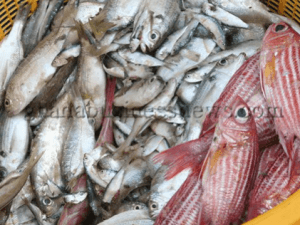Ministry of Fisheries collaborates with Norway to manage challenges
 The Ministry of Fisheries and Aquaculture Development has partnered the Norwegian Government to come up with strategies for the sustainable development of aquaculture and control of problems associated with fisheries in the country.
The Ministry of Fisheries and Aquaculture Development has partnered the Norwegian Government to come up with strategies for the sustainable development of aquaculture and control of problems associated with fisheries in the country.
The partnership would facilitate intense interactions to share experiences, build capacities and co-operation in all aspects of fisheries with emphasis on developing tools for their management under Norway’s “Fish for Development” programme.
The Fish for Development (FfD) programme would consolidate efforts made by the Sector and place more emphasis on research and development in fish health to revamp the sector to increase productivity.
Mrs Elizabeth Afoley Quaye, the Sector Minister, said this in a presentation delivered on her behalf at a workshop organised on the “FfD Programme” in Accra on Tuesday.
She said the Fishery sector was valued at around $1 billion and contributed 1.1 per cent to the Agricultural Gross Domestic Product.
She said currently, 10 per cent of the population thus 2.7 million, derived their livelihood from fish farming, processing and through gear and ancillary services.
She noted that Ghana had its fair share of difficulties in managing her fisheries resources due to a myriad of challenges, adding that the challenges must be met with more enthusiasm and co-operation with international organisations.
Mrs Quaye said the Government would thrive to promote a developed fishery sector before 2023, adding that declines in the Marine Capture Fisheries needed to be addressed earnestly to bridge the gap in fish food sufficiency with improved technical support and research.
Current production from aquaculture stands around 53,000 metric tonnes of Tilapia and Catfish.
The Minister noted that the Ghana National Aquaculture Development Plan had been developed to enable the country take advantage of her biophysical and socio-economic environment.
She said strong research capacity and rising fish prices locally and globally significantly bridged the huge gap between national fish demand and supply in the medium term.
The overall goal of the Fisheries Sector in the medium term is to transform it to become a viable economic venture to attract private capital through accelerated aquaculture development and sustainable management of fisheries resources.
Dr Edgar Brun, the Head of Epidemiology of the Norwegian Veterinary Institute, said the biggest hindrances in the development of the fishery sector were infections and diseases.
He said fish farming was mostly operated in an open or semi-open systems in Norway, which made it easy to detect disease infestation.
Dr Brun advised the Sector to devise mechanisms to encourage field visits; build diagnostics; prevention, containment and contingency; and research to promote sustainable fisheries.
“The sector needs to operate aquaculture in an efficiently and climate friendly way as much as possibly because it will have higher influence on production and supply of aqua food in the next 10 years due to how much the population is increasing,” he said.
Mr Oyvind Udland Johansen, the Deputy Head of Mission, Norwegian Embassy, told the Ghana News Agency in an interview that the partnership was not a financial support.
He said the partnership was based on encouragement of competence and capacity building to enhance resource management in the fishery sector.
Mr Johansen said they were also prepared to contribute immensely towards formulation of beneficial rules and regulations in the fishery sector.
“In Norway, we have been working in the fisheries and aquaculture sector for many years and so we believe that we have some experience that some could be valuable for the growth of the Ghanaian fishery sector,” he said.
Source: GNA
